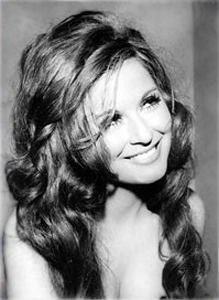Soad Hosny
Soad Hosny | |
|---|---|
 Soad Hosny 1972 | |
| Born | Souad Muhammad Kamal Hosny |
| Other names | Souad Hosni |
Soad Mohamed Hosny (Arabic:سعاد محمد حسني January 26, 1942 – June 21, 2001) was an Egyptian actress. Hosny was known as the "Cinderella" of Egyptian cinema and one of the most influential actresses in the artistic arena. She ascended to stardom in the end of the 1950s, performing in more than 83 films between 1959 and 1991 . A majority of her films were shot in the 1960s and 1970s. Her final screen appearance was in the 1991 film The Shepherd and the Women, directed by her ex-husband Ali Badrakhan.
Biography
Career
Hosny started her career at a very young age, through singing Okht El Qamar (Sister of the Moon) in the famous radio children program Baba Sharo. A family friend, Abdel Rahman el-Khamissy (a writer/director) discovered her acting talent and asked an Arabic language teacher at the time to give her singing lessons. Abdel Rahman was screening for the film Hassan We Na’ima, and wanted to present Hosny as his new discovery in the role of Na’ima. The film was produced and directed by Henry Barakat.
Family
Notable family members
- Father: Mohammad Hosny - Egyptian calligrapher
- Half sister: Nagat el Saghira - Egyptian singer
- Brother: Ezz Eddin Hosny - music composer
- Brother: Sami Hosni - Cello musician / Jewelry designer / Arabic calligrapher
Marriages
Hosny was married for twelve years to film director Ali Badrakhan, whom she became pregnant from and, shortly after, miscarried. She later married Zaki Fateen Abdel Wahab, the son of Fateen Abdel Wahab (film director) and Leila Mourad. Hosny's marriage was to director Salah Kurim.Her last husband was to screenwriter Maher Awad.
Death
Hosny died in London, England in 2001. This occurred after she had suffered severely from an unknown illness for five years. Hosny had sought treatment in the UK after sustaining a spinal fracture which had forced her to leave Egypt.
In 2001, she was found on the sidewalk below the building in which she was living; she had fallen from the balcony of her apartment. Courts in England could not decide whether Hosny had committed suicide or had been killed by her care-taker. In 2002, however, British courts decided that the cause of Hosny's death had been a suicide, although substantial evidence suggested she had been murdered. Prosecutes argued that a woman on the verge of suicide would not have been in the right state of mind to cut through steel netting. Also, while one slipper was still on her foot, the other was found in her bathroom suggesting she has been dragged to the balcony. It has been noted that Hosny has recorded her diaries on tape in preparation for the publication of her biography. This is cited as a motive for murder as the tapes went missing after her death and also because they were said to contain material that would have hurt important public figures in Egypt.
Suad Hosni's death was the third in a series of Egyptian notable death; all had died in the same way. Hosny was under therapy for depression at the time. She died on Abdel Halim Hafez's birthday – one of the many people who influenced her on screen and in her real life.
Selected filmography
- Hassan wa Na'ima (Hassan and Na’ima) (1959).
- Esha'a hob (Rumour of Love) (1960).
- Banat waal saif, El (The Girls and the Summer) (1960).
- He talata (H-3) (1961).
- Aaz el habaieb (I Want Love) (1961).
- Ghosn el zeitoun (The Olive Branch) (1962).
- Dow el khafet, El (The Dim Light) (1962).
- Mawed fil borj (Meeting at the Tower) (1963).
- Al-sahera al-saghira (The Little Sorceress) (1963).
- Morahekan, El (The Two Young Men) (1964).
- Garima el dahika, El (The Funny Crime) (1964).
- Awwal hob (First Love) (1964).
- Ariss yassel ghadan, El (The Bridegroom Arrives Tomorrow) (1964).
- Tareek, al- (The Road) (1964).
- Gharamiyat Imraa (A Woman's Affairs) (1966).
- Shakket el talaba (Students' Apartment) (1966).
- Chakawet rejala (The Awful Men) (1966).
- Lailat el zafaf (The Wedding Night) (1966).
- Al-Kahira thalatheen (Cairo 1930) (1966).
- Saghira ala elhob (Too Young to Love) (1966).
- Shabab magnoun geddan (Very Crazy Youth) (1967).
- Lekaa el tani, El (The Second Meeting) (1967).
- Zawja al-thaniya, al- (The Second Wife) (1967).
- Zawag alla tarika el-hadissa (Marriage a la moderne) (1968).
- Sit el-nazra, El- (The Headmistress) (1968).
- Nil wal-Hayat, al- (The People of the Nile) (1968).
- Baba ayez keda (Daddy Wants it That Way) (1968).
- Ikhtiyar, al- (The Choice) (1970).
- Al-hob al-dayi (Lost Love) (1970).
- Zawgati wal-kalb (My Wife and the Dog) (1971).
- Khalli Balak min Zouzou (Watch out for Zouzou) (1972).
- Ghurabaa (Strangers) (1973).
- Amira hobi ana (My Love Amira) (1974).
- Ala min notliq al-rasas (Whom Should We Shoot?) (1975).
- Al-Karnak (The Karnak Cafe) (1975).
- Chafika wa Metwalli (Chafika and Metwalli) (1979).
- Maowid ala ashaa (A Dinner Date) (1981).
- Al -Mashbouh (The Suspect) (1984).
- Howa wa Heya (Him and Her) (TV series with Ahmed Zaki).
- Al-Ra'i wal Nisaa (The Shepherd and the Women) (1991).
External links
- Soad Hosny at IMDb
- Official website (Arabic)
- Egyptian screen star dies - BBC News
- Egyptians mourn screen Cinderella - BBC News
